Get caught up with last year’s Data for Justice analysis of the BPD budget, and other work around policing in Massachusetts.
Last month, Boston’s Acting Mayor Kim Janey released her recommended City budget for the upcoming 2022 fiscal year (FY). This budget claims to double down on reducing Boston police overtime, deepening last year’s $12 million budget cut by an additional $4.9 million.
The problem? As recent ACLU analysis shows, without a simultaneous commitment to reining in the power of police unions and penalizing Boston Police Department (BPD) budgetary overages, this “cut” will simply never come to be. Taken together with the fact that Mayor Janey’s recommendation doesn’t really touch the $355 million budgeted for non-overtime policing and otherwise ignores advocates’ calls to divest from police, the FY22 BPD budget is effectively unchanged from years past.
New analysis by the ACLU of Massachusetts unpacks the Boston Police Department budget – again – making it clear that it is effectively no smaller than previous years’ budgets.
The proposed Boston police budget is more of the same.
Numbers show that Mayor Janey’s proposed BPD budget is not a departure from previous BPD budgets. Despite misleading claims around reallocating police overtime, next year’s budget will maintain the status quo in terms of the overall BPD budget, the size of the force, and more.
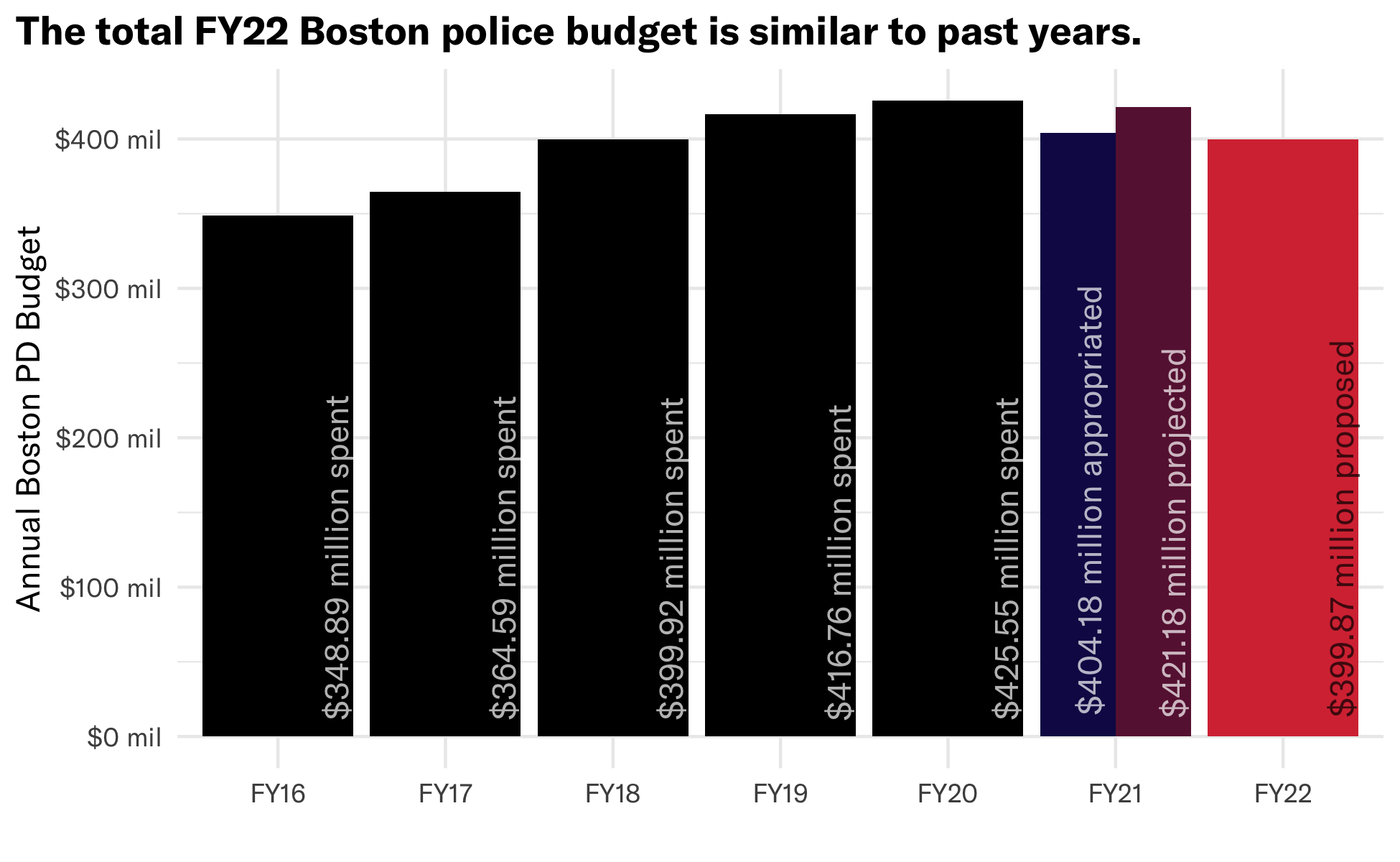
The BPD budget is still the second-largest line item in the whole city, second only to Boston Public Schools. It is still 1.5x larger than the Cabinet of Administration and Finance (which constitutes 17 individual departments), 9x larger than the Library Department, and 110x larger than the Office of Arts and Culture. The newly-created Office of Police Accountability and Transparency is but a drop in the bucket – for comparison, it’s just over half of the annual BPD clothing allowance ($1.9 million proposed for FY22).
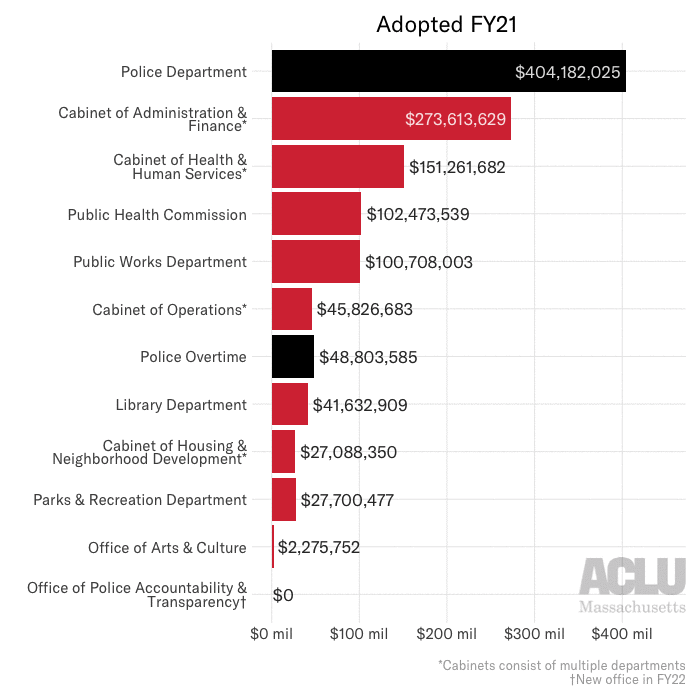
In FY20, Boston police employees were still paid almost $58,000 more than non-BPD City employees – averaging $132,000 in yearly earnings – and over 500 BPD employees still made more than Boston’s Mayor (519 this time).
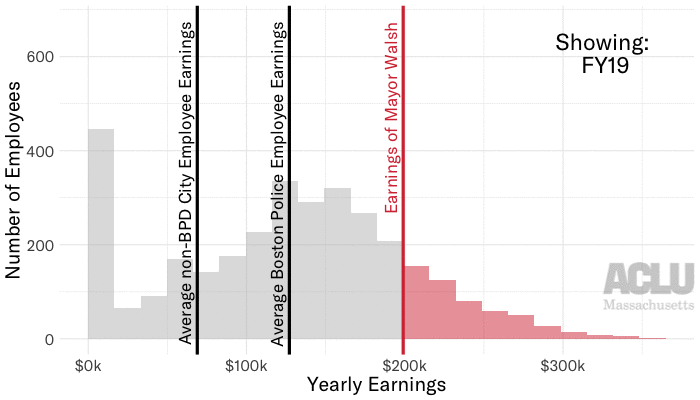
Actually, BPD paychecks swelled even larger. Among the top 20 BPD earners, almost all of them made more in FY20 than they did in FY19:
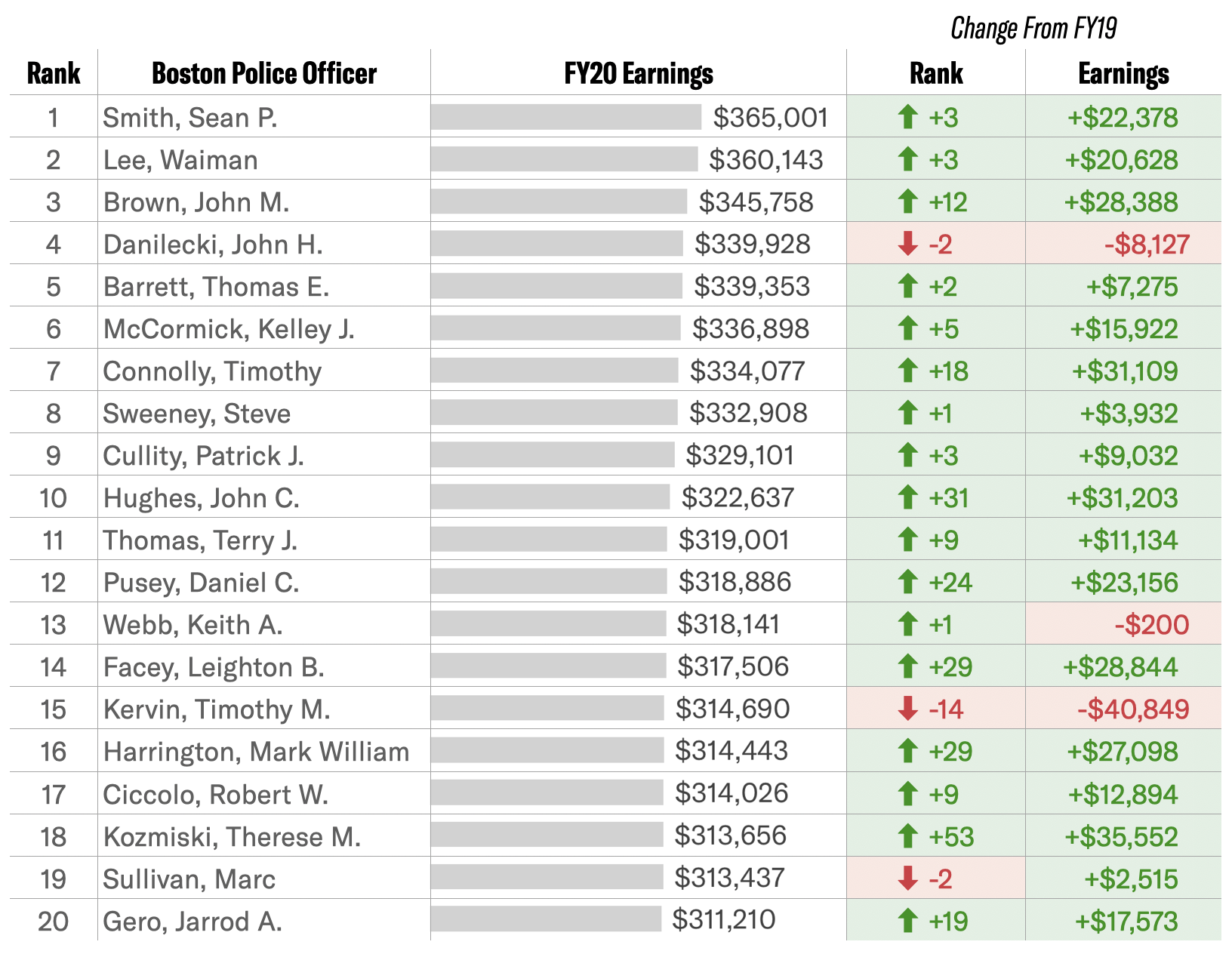
And while the status quo is upheld, the true causes of exorbitant police budgets go unaddressed.
The $22 million “cut” to overtime means… nothing.
Though the mayor’s office is trying to pass it off as a $21.9 million cut, it’s important to note that the BPD overtime budget cut is actually only $4.9 million – from $48.8 million allocated last year to $43.9 million allocated this year. The $22 million figure is not the budgetary difference, but rather the difference from the FY21 projected spending ($65.8 million, according to the BPD).
But, even more fundamentally, it’s critical to debunk a central myth that underlies Mayor Janey’s BPD budget: that the City budget as it stands currently has any power over police overtime spending. Serious contractual and legal changes are needed – largely changes the mayor can make – before any police budget cuts can be meaningful. As laid out in a recent ACLU of Massachusetts analysis, the City’s current interpretation of an exception in the Boston Charter means that the BPD has no guardrails stopping it from grossly overspending.
This blank check comes at a mighty cost: projections of FY21 spending show police overtime is estimated to go $20 million over budget by the end of June.
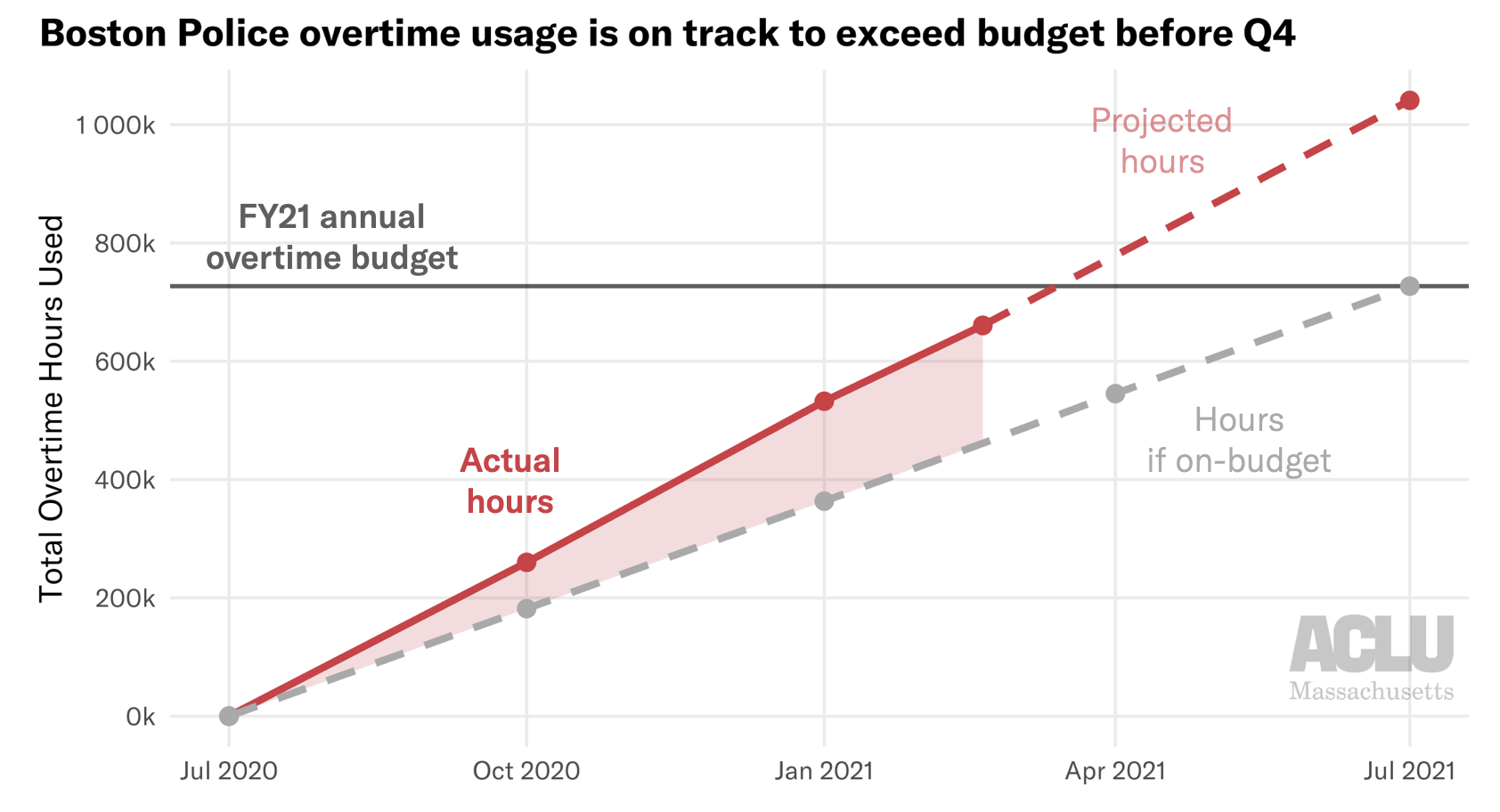
If the BPD couldn’t actualize a $12 million overtime cut during a year when sports stadiums stayed empty and almost all public events were either cancelled or went virtual, why would they be able to actualize a $22 million cut in post-pandemic Boston? It is foolish for the City to expect a different outcome the second time around.
Without taking action that actually changes the system within which the BPD currently operates, the mayoral administration’s rhetoric around reallocating police overtime in next year’s budget is just that: empty rhetoric.
Mayor Janey’s “solution” to overtime will exacerbate the problem.
The Mayor’s recommended budget proposes hiring at least 50 more cops as a means of decreasing overtime spending. This idea is not new among those who would politically benefit from a more powerful police department; Boston City Councilors Ed Flynn and Annissa Essaibi George, as well as the Boston Police Patrolmen’s Association, frequently push to increase the size of the police force. But this solution, too, is based on a myth: that Boston’s police overtime problem is caused by too few police in the ranks. This is untrue; Boston’s police overtime problem is caused by exploitative and unsupervised policing practices that allow the BPD to bleed funds from the City.
Especially when considering the OT problem as a whole – from four hours of pay for 15 minute court appearances, to the Department’s inability to explain the cause of increased injury and sickness even predating COVID-19, to their reluctance to open up administrative positions to civilians, to the secrecy over the minimum staffing level formula – it becomes clear that overtime is not an issue of how many officers are clocking in.
Indeed, historical Boston budget data show that there has been no correlation between a larger police force and lower police overtime spending over the past decade. Some years when the force grew saw higher OT expenditures (e.g., 2014, 2020), and some years when the force shrunk saw lower OT costs (e.g., 2016, 2018). This isn’t surprising: more police lead to more extended tours and more court overtime – and new personnel aren’t necessarily assigned to the units using the most replacement OT.
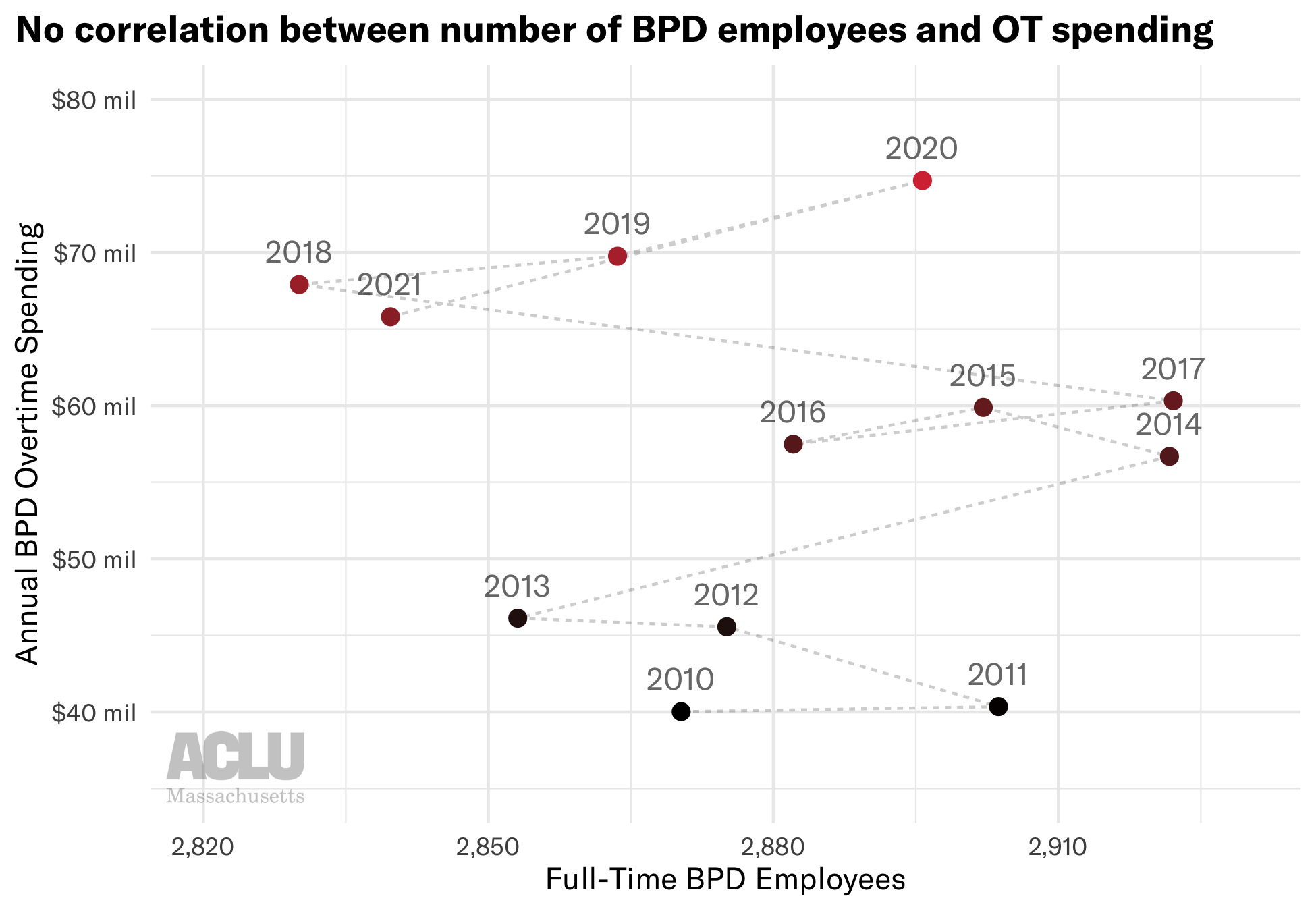
All in all, hiring more officers would do nothing to resolve the BPD’s overtime problem… or to address the remaining hundreds of millions of dollars allocated to the BPD.
Overtime is just the tip of the iceberg.
Critically, Mayor Janey’s focus on cutting only overtime fails to address the whopping $355 million still allocated to the Boston police for non-overtime expenses. She makes no attempt to reduce BRIC funding, cut spending on military equipment, civilianize traffic enforcement, reduce funds for the Youth Violence Strike Force (“gang unit”), or adopt other recommendations urged by community groups.
What’s worse, Mayor Janey’s recommendation wholly ignores the harm that policing already causes to Black and brown communities across Boston, and that community leaders have been protesting for decades. The City’s vague proposal for “alternative policing,” which will work with the BPD, isn’t an acceptable alternative. As the DefundBosCops coalition emphasizes, we need to reroute funds and power into alternative safety initiatives, not just revamped policing. More boots on the ground will solve neither our fiscal dilemma, nor our ongoing local problems with violent and discriminatory policing.
In Boston, police overtime has become smoke and mirrors which distract from more important and urgent policing problems in the City.
Our vision for reinvesting police budgets should not stop at marginal and meaningless budget cuts – and certainly should not include increasing the number of police officers. What we need are new executive priorities that open the door to true budgetary and policy accountability from the police. Only then will efforts to divest from policing and reinvest in community initiatives even be feasible in Boston.
Yet in the shadow of a year of unprecedented international activism around racist police violence and renewed public scrutiny on exorbitant police budgets, the Mayor’s recommended budget shows that Boston taxpayers are about to foot the bill for yet another year of harmful policing.
The mayor’s office must systematically transform the nature of police funding in Boston by committing to strong reforms in police union contracts, and by explicitly adopting a more conservative interpretation of the overspending exception in the City Charter. Last year, then-Councilor Kim Janey called upon the Mayor to cut the BPD budget by 10 percent; this year, she has the power to that, and more, herself.
Additionally, the Boston City Council must reject Mayor Janey’s recommended budget, instead pushing for a budget that actually divests from police spending beyond just overtime, rejects any new police hires, and truly reinvests in community initiatives.
When it comes to police spending in Boston, we can no longer accept more of the same.
What to do about it:
- Boston residents: Take and share the Boston People’s Budget survey to voice your priorities for where taxpayer dollars should go in the City of Boston
- Follow Muslim Justice League and watch #DefundBosCops on Twitter and Instagram
- Email and call Mayor Kim Janey and the Boston City Council to vocalize your support for smaller police budgets, transparency around police contract negotiations, and consequences for police overspending.
- Sign up to testify at Boston City Council hearings on the budget to urge the Council to reject the proposed BPD budget:
- Monday, May 10, 2021, 2 PM ET: Hearing on the Boston Police Department
- Wednesday, May 26, 2021, 3 PM ET: Carryover Hearing on the Boston Police Department
- Thursday, June 3, 2021, 6 PM ET: Dedicated Public Testimony
Where do these data come from?
- Boston City Council documents
- Data on BPD OT usage presented at March 12 Boston City Council hearing
- Boston City budget website
- Overview of proposed citywide FY22 operating budget
- Boston public safety cabinet (including the office of emergency management, fire department, and police department) adopted FY07-21 and proposed FY22 budget, including line items by accounts payable, and list of department personnel & salaries
- Boston’s open data portal
- Proposed and adopted operating budgets from 2020 and 2021, broken down by cabinet, department, and program
- City of Boston 2020 employee earnings report
This analysis benefitted from feedback and input from members of the Muslim Justice League, the Youth Justice and Power Union, and the Building Up People Not Prisons Coalition.
